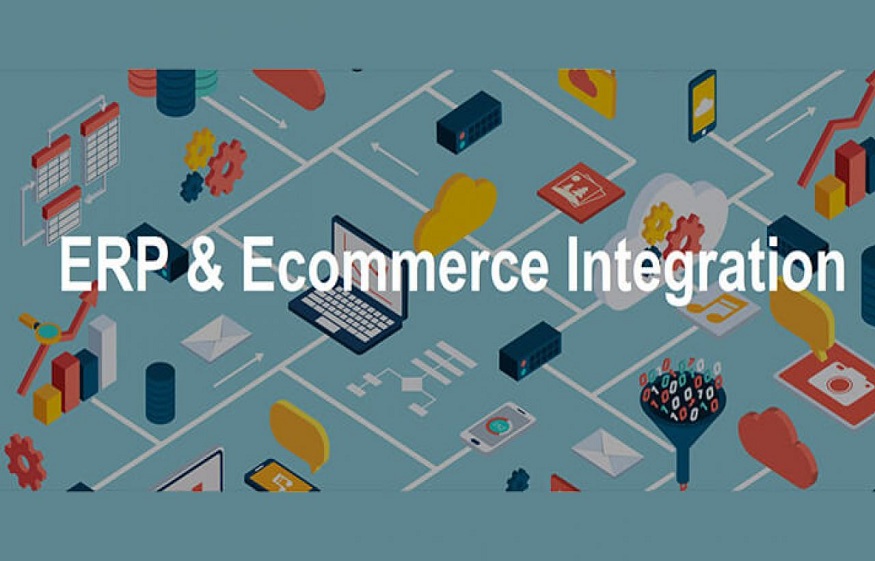Benefits of Integrating Your eCommerce And ERP

As a wholesaler, you know the challenges of managing an online business. There is always work to be done. Your everyday workload consists primarily of finding suppliers, completing orders, and selling goods. Keeping things afloat may be more difficult than actively expanding your company. Automation, however, is a more effective method. Or let technology handle the menial aspects of the business. Before computers took over, everything had to be done by hand. Back then, customer and sales records and inventory quantities were stored in closets and drawers.
Now that you have a new support system, you may concentrate on the areas of your organization that you find most appealing. Contemporary B2B eCommerce solutions can be integrated with your inventory.
The Importance of Ecommerce Inventory Integration
A B2B eCommerce company needs all its moving pieces to function properly. The complexity of the system increases as the business expands. The likelihood of costly errors rises in the absence of effective management. These errors, albeit little on their own, can build up and lead to the collapse and closure of your company. You may simplify and reduce complexity in your company processes through automation. You can integrate your inventory system via an integration API rather than depending on people. As a result, the system now works for you rather than the other way around. You can reallocate resources to build your firm through automation and integration without experiencing spiraling complexity.
Save Energy, Money, and Time Through Automation
You’re typically in the “good enough” stage when launching your business. Since you only have a small number of clients, it is OK to have their information dispersed through notes, emails, and spreadsheets. You have a small inventory, so manually updating it will do. Dealing with them is sufficient because you only utilize a small number of apps and tools to keep things operating. However, what is sufficient initially becomes a bottleneck as your organization expands. The answer to reducing this bottleneck is automation. This is how:
- It saves you time — Numerous calculations can be made by inventory management software for wholesale, and your inventory can be updated as a result. You spent minutes, if not hours, doing this task. Instead, you may use that time to complete more worthwhile things. Allow the computer to handle the menial task.
- It saves you energy — Keeping manual records of your inventory is tedious and time-consuming. What occurs after a customer purchases from your website? You must locate their contact information, send them the order, revise your inventory counts, and complete the necessary accounting. You don’t need to perform that if you have a strong B2B order management system.
- It saves you money — Keeping manual track of an expanding and constantly changing inventory becomes prohibitively expensive. You need to hire additional people, train them, and budget for possible mistakes. However, our program will continue if there are 100 or 10,000 different products in your catalog.
Leverage Inventory Metrics for Sales and Marketing Campaigns
Better customer data insight is a benefit of centralizing your data in a single automated hub. These businesses purchase your goods frequently and contribute significantly to your revenue. Make every effort to keep things that way. Give them exclusive offers or discounts. Give them first dibs on expensive products that might benefit their firm.
Another benefit of the b2b wholesale platform is knowing who your best clients are. You might seek out other companies with similar items and market to them. Conversely, if any of your products could be doing better, you can decide which ones to remove from your catalog. Better data will enable you to develop marketing programs targeting the correct customers and boosting revenue.
Reduce ERP Burden
It’s crucial to consider how much strain your ERP is under from routine tasks. Problems arise when you ask the software to perform functions beyond its capabilities. These problems could result in system sluggishness, subpar performance, and other issues that lessen the client experience.
Of course, companies frequently become aware of these problems and try to overcome them by making adjustments they never anticipated. This leads to further resource and feature stretching, which furthers the system’s inefficiency. By linking your ERP service to an e-commerce platform, you free up your ERP of the burdens associated with commerce, and any features or eCommerce-related stretches are removed.
In other words, with less demanding functions required, tight system integration increases the efficiency of your ERP. As a result, the IT and ERP teams can keep selecting the best options for each system. The system will typically require fewer plugins, integrations, and maintenance.
Additionally, security and PCI compliance is simpler to maintain with an external software-as-a-service (SaaS)-based eCommerce solution. Teams may concentrate on these crucial areas rather than routine maintenance thanks to lower expenses and fewer development hours to maintain the system operationally.
Enhance Customer Experience
Giving your consumers a more individualized experience is possible by integrating your B2B eCommerce platform with an ERP solution. For instance, the integration can access a customer’s purchase history when browsing a product on your website and offer additional items they would like. Due to the data being stored in separate systems in silos, integration is the only way to make this personalization possible. By providing omnichannel self-service experiences, brands remove the need for customer calls for purchase confirmation and changes.
Conclusion
B2B eCommerce solutions enable you to track your inventory at any time from anywhere. B2B platforms are constantly expanding their product sales possibilities, and these options are heavily reliant on the technical prowess of the integrated platform. The integration provides automation through machine learning (ML) and artificial intelligence (AI) capabilities, personalization, and excellent customer service. According to a survey of B2B marketers, the most interesting new technologies are AI and machine learning.






